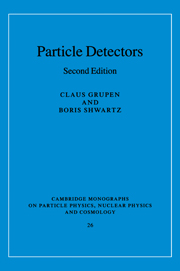Book contents
- Frontmatter
- Contents
- Preface to the second edition
- Preface to the first edition
- Introduction
- 1 Interactions of particles and radiation with matter
- 2 Characteristic properties of detectors
- 3 Units of radiation measurements and radiation sources
- 4 Accelerators
- 5 Main physical phenomena used for particle detection and basic counter types
- 6 Historical track detectors
- 7 Track detectors
- 8 Calorimetry
- 9 Particle identification
- 10 Neutrino detectors
- 11 Momentum measurement and muon detection
- 12 Ageing and radiation effects
- 13 Example of a general-purpose detector: Belle
- 14 Electronics
- 15 Data analysis
- 16 Applications of particle detectors outside particle physics
- Résumé
- 17 Glossary
- 18 Solutions
- Appendix 1 Table of fundamental physical constants
- Appendix 2 Definition and conversion of physical units
- Appendix 3 Properties of pure and composite materials
- Appendix 4 Monte Carlo event generators
- Appendix 5 Decay-level schemes
- Index
8 - Calorimetry
Published online by Cambridge University Press: 19 October 2009
- Frontmatter
- Contents
- Preface to the second edition
- Preface to the first edition
- Introduction
- 1 Interactions of particles and radiation with matter
- 2 Characteristic properties of detectors
- 3 Units of radiation measurements and radiation sources
- 4 Accelerators
- 5 Main physical phenomena used for particle detection and basic counter types
- 6 Historical track detectors
- 7 Track detectors
- 8 Calorimetry
- 9 Particle identification
- 10 Neutrino detectors
- 11 Momentum measurement and muon detection
- 12 Ageing and radiation effects
- 13 Example of a general-purpose detector: Belle
- 14 Electronics
- 15 Data analysis
- 16 Applications of particle detectors outside particle physics
- Résumé
- 17 Glossary
- 18 Solutions
- Appendix 1 Table of fundamental physical constants
- Appendix 2 Definition and conversion of physical units
- Appendix 3 Properties of pure and composite materials
- Appendix 4 Monte Carlo event generators
- Appendix 5 Decay-level schemes
- Index
Summary
Most particles end their journey in calorimeters.
AnonymousMethods of particle energy measurement in modern high energy physics have to cover a large dynamical range of more than 20 orders of magnitude in energy. Detection of extremely small energies (milli-electron-volts) is of great importance in astrophysics if one searches for the remnants of the Big Bang. At the other end of the spectrum, one measures cosmic-ray particles with energies of up to 1020 eV, which are presumably of extragalactic origin.
Calorimetric methods imply total absorption of the particle energy in a bulk of material followed by the measurement of the deposited energy. Let us take as an example a 10 GeV muon. Passing through material this particle loses its energy mainly by the ionisation of atoms while other contributions are negligible. To absorb all the energy of the muon one needs about 9m of iron or about 8m of lead. It is quite a big bulk of material!
On the other hand, high-energy photons, electrons and hadrons can interact with media producing secondary particles which leads to a shower development. Then the particle energy is deposited in the material much more efficiently. Thus calorimeters are most widely used in high energy physics to detect the electromagnetic and hadronic showers.
- Type
- Chapter
- Information
- Particle Detectors , pp. 230 - 272Publisher: Cambridge University PressPrint publication year: 2008

